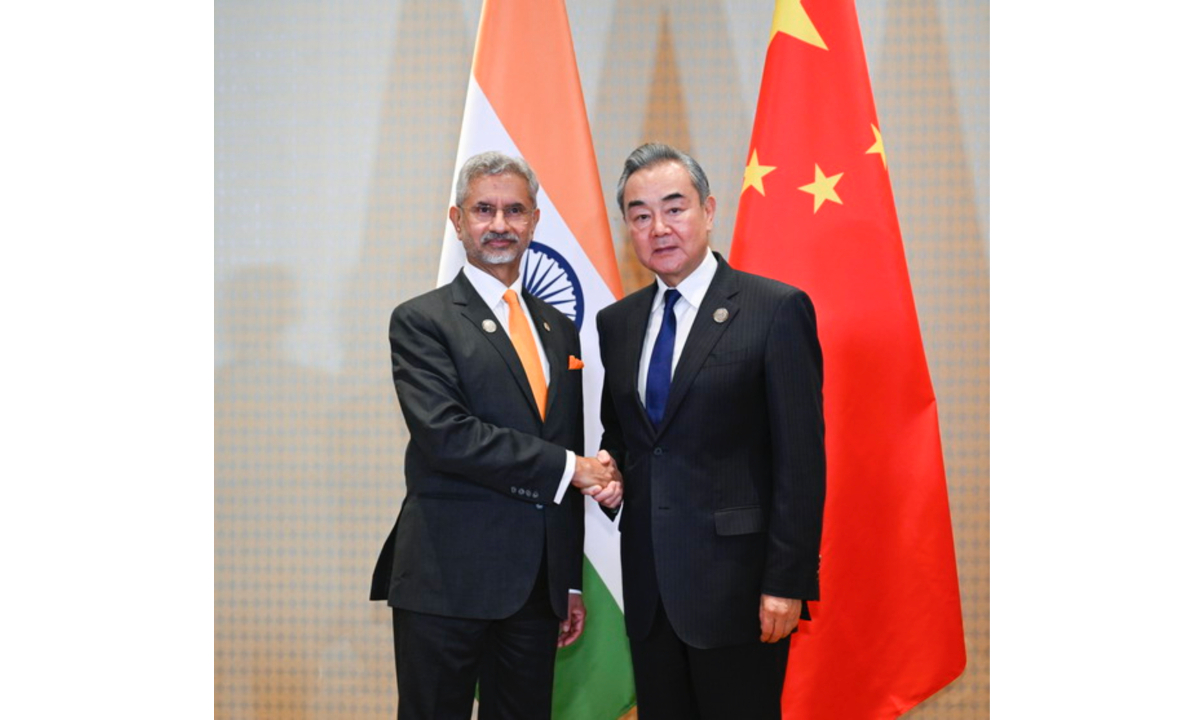
Chinese Foreign Minister Wang Yi meets with Indian External Affairs Minister Subrahmanyam Jaishankar on the sidelines of the G20 Summit in Rio de Janeiro, Brazil on November 18, 2024. Photo: fmprc.gov.cn
China and India should strive to make practical progress as soon as possible in areas such as resuming direct flights, exchanging journalists, and facilitating visa issuance process, Chinese Foreign Minister Wang Yi said during his meeting with Indian External Affairs Minister Subrahmanyam Jaishankar on the sidelines of the G20 Summit in Rio de Janeiro, Brazil on Monday.
Wang Yi, also a member of the Political Bureau of the Communist Party of China Central Committee, said that Chinese President Xi Jinping and Indian Prime Minister Narendra Modi recently held a successful meeting in Kazan, Russia, which marked a restart for China-India relations. It is in line with the fundamental interests of the people of both countries and meets the expectations of the Global South countries, and follows the correct path of historical progress.
Wang said that both sides should implement the important consensus reached by the state leaders, respect each other's core interests, enhance mutual trust through dialogue and communication, and handle differences with sincerity and integrity, in a bid to push the bilateral relations back to a stable and healthy development path.
Wang noted that more positive signals should be sent, actions to foster trust and reduce suspicion should be taken, cooperation should be expanded, and unnecessary frictions should be minimized. He also urged that both sides should strive to make practical progress as soon as possible in areas such as resuming direct flights, exchanging journalists, and facilitating visa issuance process.
Next year marks the 75th anniversary of the establishment of diplomatic relations between China and India. Wang suggested that both sides plan commemorative activities, encourage exchanges and visits across various levels and fields, and work to enhance understanding and mutual trust.
Wang pointed out that as two major neighboring developing countries, China and India share far more common interests than differences. Both sides should view each other’s development as an opportunity and work together for mutual development and revitalization, which not only benefits the legitimate rights and interests of developing countries, but also contributes to advancing the process of global multipolarity.
Since both China and India adhere to a non-aligned foreign policy, uphold multilateralism, and support the democratization of international relations, the two sides should continue to strengthen coordination and cooperation in international affairs, promoting greater development of mechanisms such as BRICS and the Shanghai Cooperation Organisation, Wang said.
Jaishankar said that during the BRICS Summit in Kazan, the leaders of the two countries reached consensus on promoting the stable development of China-India relations, and he expressed pleasure in seeing both sides taking steps to implement the state leaders’ consensus and achieving positive progress.
Jaishankar said that it is hoped that relevant dialogue mechanisms be resumed as soon as possible, and maintain the positive momentum in improving bilateral relations through enhanced communication.
The consensus between India and China far outweighs their divergence, and both sides should view bilateral relations from a strategic perspective, and address specific issues with a more positive attitude, ensuring that individual differences do not define the relationship, Jaishankar said.
Jaishankar said that India is willing to take the 75th anniversary of the establishment of diplomatic relations between China and India next year as an opportunity to promote China-India relations. Both countries play important roles in international affairs, which reflect the potential of their cooperation.
India also opposes unilateralism, does not support military alliances, and advocates for the democratization of international relations. India is ready to strengthen coordination and cooperation with China in multilateral mechanisms such as the G20 and BRICS, Jaishankar added.
Global Times




